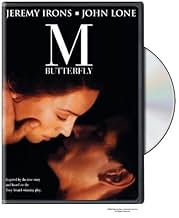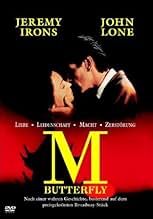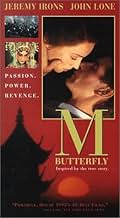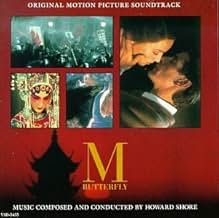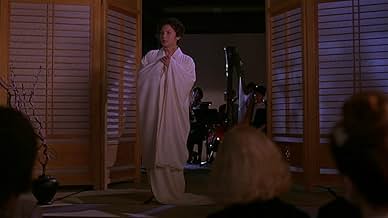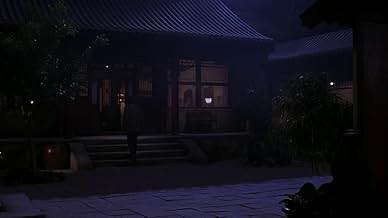IMDb रेटिंग
6.7/10
11 हज़ार
आपकी रेटिंग
अपनी भाषा में प्लॉट जोड़ेंIn 1960s China, French diplomat Rene Gallimard falls in love with an opera singer, Song Liling - but Song is not at all who Gallimard thinks.In 1960s China, French diplomat Rene Gallimard falls in love with an opera singer, Song Liling - but Song is not at all who Gallimard thinks.In 1960s China, French diplomat Rene Gallimard falls in love with an opera singer, Song Liling - but Song is not at all who Gallimard thinks.
- पुरस्कार
- 1 जीत और कुल 1 नामांकन
फ़ीचर्ड समीक्षाएं
This is David Cronenburg's best, based on a true story as bizarre and compelling as his other bizarre and compelling stories. John Lone is wondrous and Jeremy Irons is his usual cold, repressed upper class self. Perfect casting for a provocative director filming a moving story of love and loss.
M. BUTTERFLY continues to rank among the more important cinematic adaptations of a brilliant play - this one by the playwright David Henry Hwang. Having the pleasure to see two productions of the play - New York and Los Angeles - and viewing the film (1993) in the theater and on DVD brings an immense amount of satisfaction of just how fine this work is and continues to satisfy. The fact that David Henry Hwang wrote the screenplay suggests how true to the original the film is and how much of an impact it makes on the viewer
M. BUTTERFLY is based on a true story that stunned the world. During the Cultural Revolution in China in the mid-1960s, a French diplomat René Gallimard (a brilliant portrayal by Jeremy Irons) falls in love with a Chinese opera singer Song Liling (John Lone) - women were never allowed to sing in the Beijing Opera so the fact that Song is a man is credible. Song Liling touches him with a love as vivid, as seductive--and as elusive--as a butterfly. The love affair is so fragile and respectful that René does not suspect that Song is a man in disguise. René Is an important diplomat with the French Embassy, married to Jeanne (Barbara Sukowa), and is responsible for maintaining the high standards of diplomacy. Song Liling has been placed in the position of an undercover agent to gather secrets from the Embassy about the American plans in Vietnam. As René is promoted he demands to see his M. Butterfly without her clothes, an Song's only protection about her gender identity is to reveal that she is pregnant with René's child and must leave to be with her family until the child is born. As the Cultural Revolution heightens the French Embassy is to be diminished and it is discovered that René has been in a liaison with with a Chinese spy and is sent back to France to be imprisoned. When he is put on trial Song appears in Paris to be placed on the witness stand and since years have passed since their last meeting, Song attempts to offer herself once again to be René's Butterfly. Whether or not René's passion was a flight of fancy, it sparked the most vigorous emotions of his life. Only in real life could love become so unreal. And only in such a dramatic tour de force do we learn how a fantasy can become a man's mistress--as well as his jailer. In a desperately touching final scene we see the imprisoned René perform the final act from the opera that has accompanied this film - Puccini's MADAMA BUTTERFLY.
The story is at once compelling, explosive and slyly humorous, 'a work of unrivaled brilliance, illuminating the conflict between men and women, the differences between East and West, racial stereotypes--and the shadows we cast around our most cherished illusions.' The musical score by Howard Shore integrates arias and choruses from Puccini's opera with music from Chinese opera and his own sensuously beautiful original musical score. David Cronenberg directs with the tight amount of surreal disbelief the piece needs, but it is the brilliant acting of Jeremy Irons and John Lone that illuminate this film. It is a masterwork.
Grady Harp
M. BUTTERFLY is based on a true story that stunned the world. During the Cultural Revolution in China in the mid-1960s, a French diplomat René Gallimard (a brilliant portrayal by Jeremy Irons) falls in love with a Chinese opera singer Song Liling (John Lone) - women were never allowed to sing in the Beijing Opera so the fact that Song is a man is credible. Song Liling touches him with a love as vivid, as seductive--and as elusive--as a butterfly. The love affair is so fragile and respectful that René does not suspect that Song is a man in disguise. René Is an important diplomat with the French Embassy, married to Jeanne (Barbara Sukowa), and is responsible for maintaining the high standards of diplomacy. Song Liling has been placed in the position of an undercover agent to gather secrets from the Embassy about the American plans in Vietnam. As René is promoted he demands to see his M. Butterfly without her clothes, an Song's only protection about her gender identity is to reveal that she is pregnant with René's child and must leave to be with her family until the child is born. As the Cultural Revolution heightens the French Embassy is to be diminished and it is discovered that René has been in a liaison with with a Chinese spy and is sent back to France to be imprisoned. When he is put on trial Song appears in Paris to be placed on the witness stand and since years have passed since their last meeting, Song attempts to offer herself once again to be René's Butterfly. Whether or not René's passion was a flight of fancy, it sparked the most vigorous emotions of his life. Only in real life could love become so unreal. And only in such a dramatic tour de force do we learn how a fantasy can become a man's mistress--as well as his jailer. In a desperately touching final scene we see the imprisoned René perform the final act from the opera that has accompanied this film - Puccini's MADAMA BUTTERFLY.
The story is at once compelling, explosive and slyly humorous, 'a work of unrivaled brilliance, illuminating the conflict between men and women, the differences between East and West, racial stereotypes--and the shadows we cast around our most cherished illusions.' The musical score by Howard Shore integrates arias and choruses from Puccini's opera with music from Chinese opera and his own sensuously beautiful original musical score. David Cronenberg directs with the tight amount of surreal disbelief the piece needs, but it is the brilliant acting of Jeremy Irons and John Lone that illuminate this film. It is a masterwork.
Grady Harp
Jeremy Irons has specialised for many years in playing characters who build up a world of their own, and then have the world fall to pieces around them; who destroy themselves internally. This is the key characteristic for his parts in Damage, Cronenberg's Dead Ringers, Lolita (of course) and M. Butterfly. In this movie, however, it slightly misses the true impact of such events Irons has exhibited so well in those other parts, mainly because the final "revelation" actually doesn't happen until after Gallimard's world has already collapsed, with Butterfly's arrest (by the Red Guard, as an artist and thus a criminal) and his own recall to Paris. But he doesn't find out the truth about his Butterfly until the court case, where Irons is unable to react - he has to react without reacting, so to speak, and he just sits there looking as if he'd just bitten into a thistle. Were I to write the screenplay, I would have changed some of the order of events. It is not important to the movie that Gallimard learn of the true nature of his lover in the court room, so I would have that revelation earlier, thus completing the cycle of destruction we have seen in his life, and also avoiding that impossible ride in the police van near the end of the film. (First of all, it is impossible that two co-defendants in an espionage case would be transported together, secondly it is impossible that they be alone without a guard in the back, and thirdly it is quite impossible that the guards in the front of the van would not have noticed that one of the prisoners has taken off all his clothes!) Certain other elements also detracted from the movie. It does not do an avowedly art house film any good to Hollywood-ise things up by having Chinese people talk to Chinese people in heavily accented English.
And in the end, what was achieved? This case, as is pointed out in the film, was a national joke in France. Presumably Hwang didn't give the case the comedy treatment because he saw something deeper, something to learn about human nature. But in fact we learn very little about human nature that wasn't already obvious - the idea of subsuming one's whole being to an image of perfection; the inability to love the creator of an image if one has loved the image and discovered it to be nothing. All this is too obvious. Some merit might have been retrieved if it could be shown that Gallimard was intentionally deceiving himself, but that is clearly not the case.
An "ordinary" movie from David Cronenberg transpires to be almost too ordinary.
And in the end, what was achieved? This case, as is pointed out in the film, was a national joke in France. Presumably Hwang didn't give the case the comedy treatment because he saw something deeper, something to learn about human nature. But in fact we learn very little about human nature that wasn't already obvious - the idea of subsuming one's whole being to an image of perfection; the inability to love the creator of an image if one has loved the image and discovered it to be nothing. All this is too obvious. Some merit might have been retrieved if it could be shown that Gallimard was intentionally deceiving himself, but that is clearly not the case.
An "ordinary" movie from David Cronenberg transpires to be almost too ordinary.
In 1964, in Beijing, the French Ambassaty accountant René Gallimard (Jeremy Irons) goes to a social event without his wife Jeanne Gallimard (Barbara Sukowa) and meets the opera singer Song Liling (John Lone). René becomes attracted to Song and soon he meets her at the local opera house. He falls in love with her and Song becomes his mistress. Meanwhile Ambassador Toulon (Ian Richardson) promotes René to Vice- Consul and he becomes adviser for the French Intelligence. But Song has deep secrets that the naive René does not have any idea and believes is part of the Chinese culture.
"M Butterfly" is a strange and fascinating film inspired by true events that makes it believable. Directed by David Cronemberg, "M Butterfly" is probably one of his best films with an intriguing love story about clash of cultures, having China as background in a troubled revolutionary moment great acting and magnificent cinematography and set decoration. Even when watched more than once, "M Butterfly" is still an attractive gem. My vote is nine.
Title (Brazil): "M Butterfly"
"M Butterfly" is a strange and fascinating film inspired by true events that makes it believable. Directed by David Cronemberg, "M Butterfly" is probably one of his best films with an intriguing love story about clash of cultures, having China as background in a troubled revolutionary moment great acting and magnificent cinematography and set decoration. Even when watched more than once, "M Butterfly" is still an attractive gem. My vote is nine.
Title (Brazil): "M Butterfly"
I've been searching for this film for a while. Having seen Videodrome, The Fly and Naked Lunch, I knew that Cronenberg was capable of making compelling, disturbing, horrific pieces which resonated in a dark, menacing way; staying with you via their visceral imagery and twisted ambiance. Having seen Dead Ringers, Spider and A Dangerous Method, I knew that Cronenberg also had another side to his work. A more restrained, mature, refined yet no less affecting style which, at its best, achieved a great level of tension without the visceral gore of his aforementioned works.
What I hadn't seen was M Butterfly. The almost unmentioned work which takes Cronenberg's more mature approach to filmmaking and fulfils his promise by giving him a jewel in what is an extremely impressive crown. I greatly enjoyed the movies I mentioned in the previous paragraph but even the best ones I felt were lacking something for me to be able to say they were a masterpiece. Perhaps they felt a little convoluted, gratuitously gory, or perhaps at times distant and even lifeless in some of his later works. But M Butterfly is none of these things; well some may say its plot is convoluted but, strangely enough, it's heavily based on a true story, or rather it's based on a novel which is based on a true story.
What M Butterfly has, which many of Cronenberg's other films lack, to varying degrees, is relatability and empathy. Pure, unadulterated empathy. It presents its characters not as good or bad; it's not interested in judging or condemning; it is a film which desires to take you deep into the world of an enchanted and tortured man: Rene Gallimard. It wishes to show you his most intimate passions and desires, his triumph, his awakening, his desperation and his suffering. It wishes to explore his self- realisation, his moments of greatest happiness and it wishes to show us his ultimate tragedy.
This is a film which echoes with symbolism. Its structure is tight, its performances, by the two leads, are heartbreakingly sublime. It is influenced by opera, by Hitchcockian psychological, twisted romance, think Vertigo. Its story opens and unfolds like a delicate rose which eventually must wilt and die. This is poetry, this is humanism. This is the most accomplished and meaningful work I've seen in a long time.
If you are even slightly tempted to investigate this then know that, despite its lack of recognition and a number of poor reviews, this film had the power to tantalise and haunt, in equal measure, at least one audience member. I was taken on a journey which I intimately understood only too profoundly. Perhaps it will mean something significant to you too.
What I hadn't seen was M Butterfly. The almost unmentioned work which takes Cronenberg's more mature approach to filmmaking and fulfils his promise by giving him a jewel in what is an extremely impressive crown. I greatly enjoyed the movies I mentioned in the previous paragraph but even the best ones I felt were lacking something for me to be able to say they were a masterpiece. Perhaps they felt a little convoluted, gratuitously gory, or perhaps at times distant and even lifeless in some of his later works. But M Butterfly is none of these things; well some may say its plot is convoluted but, strangely enough, it's heavily based on a true story, or rather it's based on a novel which is based on a true story.
What M Butterfly has, which many of Cronenberg's other films lack, to varying degrees, is relatability and empathy. Pure, unadulterated empathy. It presents its characters not as good or bad; it's not interested in judging or condemning; it is a film which desires to take you deep into the world of an enchanted and tortured man: Rene Gallimard. It wishes to show you his most intimate passions and desires, his triumph, his awakening, his desperation and his suffering. It wishes to explore his self- realisation, his moments of greatest happiness and it wishes to show us his ultimate tragedy.
This is a film which echoes with symbolism. Its structure is tight, its performances, by the two leads, are heartbreakingly sublime. It is influenced by opera, by Hitchcockian psychological, twisted romance, think Vertigo. Its story opens and unfolds like a delicate rose which eventually must wilt and die. This is poetry, this is humanism. This is the most accomplished and meaningful work I've seen in a long time.
If you are even slightly tempted to investigate this then know that, despite its lack of recognition and a number of poor reviews, this film had the power to tantalise and haunt, in equal measure, at least one audience member. I was taken on a journey which I intimately understood only too profoundly. Perhaps it will mean something significant to you too.
क्या आपको पता है
- ट्रिवियाDavid Cronenberg loved the play so much that when he heard a movie was being made about it, he volunteered immediately to direct it.
- गूफ़The word accordion is misspelled "accordian" in the closing credits.
- भाव
Song Liling: The days I spent with you were the only days I ever truly existed.
टॉप पसंद
रेटिंग देने के लिए साइन-इन करें और वैयक्तिकृत सुझावों के लिए वॉचलिस्ट करें
- How long is M. Butterfly?Alexa द्वारा संचालित
विवरण
बॉक्स ऑफ़िस
- बजट
- $1,70,00,000(अनुमानित)
- US और कनाडा में सकल
- $14,98,795
- US और कनाडा में पहले सप्ताह में कुल कमाई
- $57,280
- 3 अक्टू॰ 1993
- दुनिया भर में सकल
- $14,98,795
- चलने की अवधि1 घंटा 41 मिनट
- रंग
- ध्वनि मिश्रण
- पक्ष अनुपात
- 1.85 : 1
इस पेज में योगदान दें
किसी बदलाव का सुझाव दें या अनुपलब्ध कॉन्टेंट जोड़ें



